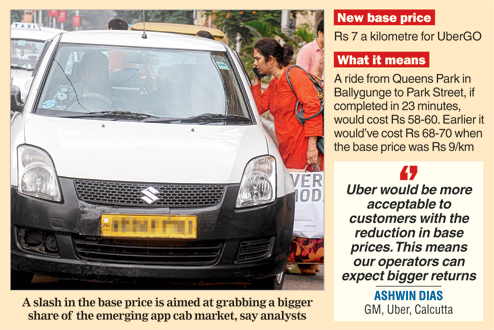
Uber on Friday announced that it had slashed the base price of UberGO from Rs 9 to Rs 7 a kilometre in Calcutta and Chennai.
The move comes at a time when there's been a growing online campaign, demanding the taxi aggregator regulate its surge pricing policy.
But a company insider said the decision was taken after analysing "city specific data" of demand and supply and had nothing to do with the campaign on change.org.
"Uber would be more acceptable to customers with the reduction in the base price. This means our operators can expect bigger returns," said Ashwin Dias, GM, Uber, Calcutta.
The cut means a ride from Queens Park in Ballygunge to Park Street, if completed in 23 minutes, would cost between Rs 58 and Rs 60 while earlier it would have cost Rs 68-70.
App-based cab operators normally charge more than the base price when there is a surge in demand in a particular area. The extra charge could be double, triple or even more than that of the base price.
The company's logic behind such a move is to help people who can afford to pay a higher price get a cab when those who do not want to pay more or don't need a cab immediately can wait for the prices to come down.
But many who have joined the online campaign against surge pricing say there have been instances when prices continue to remain high even when demand for cabs has gone down in a particular area.
The reduction in UberGO's base price brings the taxi aggregator on a par with its rival Ola, which has the same base price for Ola Mini.
"We already have a base price of Rs 7 a kilometre. We don't need to work out a new strategy in view of probable competition," said Anand Biswas of Ola. "Our company has a bigger share of the app-based pie simply because our offerings are more. A week back we started the concept of sharing and the response has been great."
Market analysts say the cut is unlikely to trigger a competitive pricing war because app cabs cannot sustain in the business by offering anything below Rs 7 a kilometre.
An analyst, however, said the slash in the base price was aimed at grabbing a bigger share of the emerging app cab market in Calcutta.
"You need to have more operators to grow. That can happen only if an operator earns Rs 2,500 or more daily from the company," an official of Meru Cabs said. "Bigger earnings will happen only if more people opt for cabs on your platform... so, this cut."
But the Uber move has left the traditional yellow and blue-and-white taxi operators fuming.
Bimal Guha of the Bengal Taxi Association, one of the oldest body of taxi operators in the city, said: "We have already asked police to penalise drivers and not taxi owners for incidents of refusal. Next week, we plan to meet to discuss our next step. We would like the government to tell us why we can't decide our fares like Uber or Ola."










